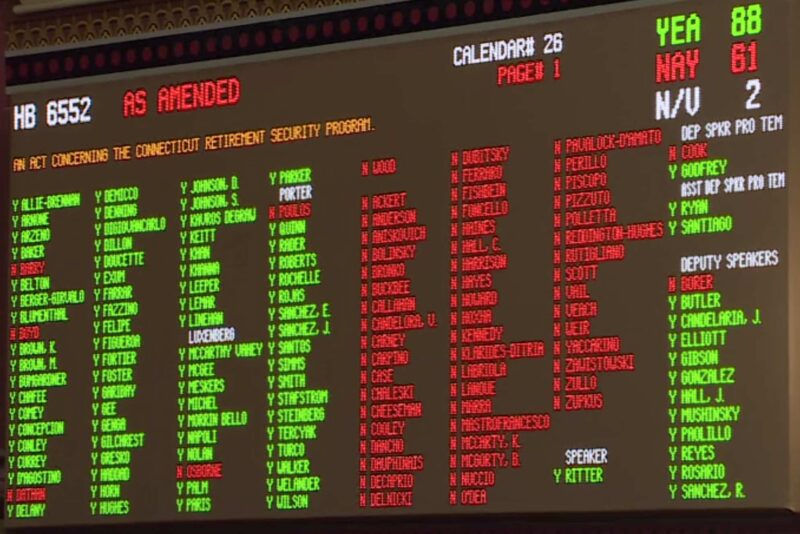House Approves State-Run Retirement Plan Penalties

The Connecticut House approved legislation May 17 that allows penalties for employers that do not comply with the state-run retirement plan mandate.
Under HB 6552, which passed on an 88-61 vote, the state Comptroller’s office can levy fines between $500 and $1,500 on businesses that fail to meet MyCTSavings program requirements.
Democratic representatives Jill Barry (D-Glastonbury), Pat Boyd (D-Pomfret), Michelle Cook (D-Torrington), Lucy Dathan (D-New Canaan), Melissa Osborne (D-Simsbury), Chris Poulos (D-Southington), and Kerry Wood (D-Rocky Hill) joined all Republicans in opposing the bill.
Employers with five or more employees—each paid a minimum of $5,000 in the calendar year—must join the program if they don’t offer employees a qualified employer-sponsored retirement plan.
Businesses that offer employees a qualified retirement savings option should certify their exemption from the MyCTSavings program, which is administered by the Comptroller’s office.
Qualifying Period Cut
HB 6552, which now awaits action by the state Senate, also reduces the program qualifying period for employees to 60 days from 120 days of employment.
In addition, it includes language clarifying that employers do not have fiduciary liability for the program’s performance.
The Comptroller’s office must send an employer two notices of noncompliance and a final notice before levying fines.
The Comptroller’s office must send an employer two notices of noncompliance and a final notice before levying fines.
Two amendments, including one allowing employees to opt into the program rather than automatic enrollment, failed on the House floor.
Employers face an Aug. 31, 2023 deadline to register with the program, a deadline that was extended in April this year.
‘Enforcement Mechanisms’
State Comptroller Sean Scanlon announced the deadline extension April 5, noting that 3,400 employers were enrolled in the program.
Scanlon said the deadline was extended “so that we can continue to build on this momentum and work with business owners to empower their employees.”
He added that the program had enrolled over 10,000 employees and had more than $3.5 million in assets.
“Our office seeks reasonable and less severe enforcement mechanisms, in line with the practices of other states.”
State Comptroller Sean Scanlon
Scanlon told a Labor and Public Employees Committee hearing on the bill earlier this year that “the state is limited in how it can enforce the law.”
“Our office seeks reasonable and less severe enforcement mechanisms, in line with the practices of other states with similar programs, to enforce the requirements of the program,” he told the committee.
Scanlon is scheduled to speak at a June 7 CBIA webinar designed to outline employer responsibilities under the MyCTSavings program.
For more information, contact CBIA’s Eric Gjede (860.480.1784) | @egjede.
RELATED
EXPLORE BY CATEGORY
Stay Connected with CBIA News Digests
The latest news and information delivered directly to your inbox.


